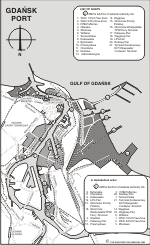|
| ||||||||||
|
|
The town of Gdańsk Gdańsk is the largest town in Northern Poland, located on the Gulf of Gdańsk, NW of the main outlet of the Wisła River, into the Baltic. It covers an area of 262 km2 and has a population of 457,717. The first historical record of Gdańsk can be found in the Latin text The Life of Saint Adalbert. Adalbert, bishop of Prague, came here in 997 on the recommendation of the Polish King Bolesław Chrobry to baptise the Pomeranian pagans. He found a populous castle town situated at the junction of the Wisła and Motława Rivers. By the end of the XI century it already had a population of 1,200 and in the XIII century, the town was granted civic rights. In 1308 the Teutonic Knights took Gdańsk through deceit and massacred its inhabitants (ten thousand people were killed). They ruled the town until 1454, at which time the thirteen-year-war began. The fleet of Gdańsk and Poland against the Teutons numbered 120 warships, making it the largest on the Baltic. After the victory Kazimierz Jagiellończyk, King of Poland, granted Gdańsk a special economic charter. Free trade in agriculture products, coming from the whole of Poland and Lithuania, formed the basis of the prosperity of the town and its port. In 1677 Gdańsk had a population of 77,000, compared to 60,000 in Hamburg. It was the largest town in Poland and one of the most important in Europe. The export of Polish cereals, at the beginning of the XVI century, amounted to around 270,000 tonnes of grain. The number of ships using the port reached 3,000 per year. Thus Gdańsk became the largest port in the Baltic area. The most splendid municipal buildings, over 300 granaries, beautiful houses and fortifications were built at that time. The rapid economic growth of Gdańsk promoted significant cultural advancements and scientific progress. In the XVII century the Polish fleet, supported mainly by Gdańsk, defeated the Swedes in the battles of Hel, Salis, Puck and Łeba and, ultimately, at the Battle of Oliwa, in 1627. In the XVIII century, however, economic development was stopped due to the Swedish wars and the first partition of Poland. After the second partition, Prussian troops moved into the town. Friedrich II, King of Prussia, imposed an economic blockade on Gdańsk. In 1770 1,988 ships still called at Gdańsk, but in 1774 only 533 vessels entered the port, and by 1782 that number dropped to 145. The town's population decreased to 15,000-20,000. After the First World War, the Treaty of Versailles restored the Polish State and also created the Free City of Gdańsk. In the following interwar period the authorities and Senate of the Free City represented German interests rather than Polish and caused friction in Polish and German relationships. The Second World War began on September 1st, 1939; the Nazi warship Schleswig Holstein opened fire on the Polish outpost of Westerplatte. In March 1945, the Soviet and Polish Armies liberated the town 70% had been destroyed. The town's centre, being of great historical value with 90% damage, has been almost completely reconstructed. Today, Gdańsk is the most significant industrial, cultural and scientific centre in Northern Poland. For many years the shipbuilding industry and commercial port services have been the main town's economic activities. Gdańsk is also the third largest tourist centre in Poland. A network of museums are the evidence of the town's glorious history. Theatres, musical institutions, galleries and various clubs provide a wonderful choice for visitors and six universities are located here. The climate of the Gdańsk region is generally mild, but changeable due to different air masses meeting here (polar and maritime, and polar and continental) and the direct influence of the Baltic Sea. The average temperature: winter -1 °C, summer +17 °C. Useful addresses and telephone numbers Country code: +48
Radiotelephones
|
|||||||||||||||||||||||||||||||||||||||||||||||||||||||||||||||||||||||||||||||||||||||||||||||||||||
|
|||||||||||||||||||||||||||||||||||||||||||||||||||||||||||||||||||||||||||||||||||||||||||||||||||||
| Ship repairsWorld Shipyardsassociations, foundations, committeescompanies by city: SZYDLOWIEC | |||||||||||||||||||||||||||||||||||||||||||||||||||||||||||||||||||||||||||||||||||||||||||||||||||||






